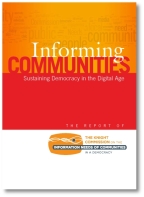Informed Communities: Global Edition

While the United States does not have 'the exclusive license to innovation in democracy and citizenship,' looking at how technology has impacted democracy in America can highlight some important lessons for strengthening democracy around the world. The Knight Commission, a partnership between the Knight Foundation and the Aspen Institute was formed to examine these issues.
The resulting report focused on the importance of 'informed communities,' which are able to fully participate in a democratic society. However, the information needs of Americans are unequally met, limiting the ability of some citizens to participating fully in government. The report presents three main ways to ensure communities are informed: maximizing available information, strengthening the capacity to engage with information, and providing opportunities for greater participation. Relevant information helps communities gather, contextualize and share information important to them. Providing tools and skills gives these communities the ability to utilize this information. Beyond this, opportunities must be present for participation in the governance systems.
The Knight Commission has also released a series of White Papers, covering topics from assessing community information needs to improving broadband systems and creating more participatory governments. Many of the conclusions found in these papers can be generalized to the wider stage of global politics. Communities across the globe struggle with unequal access to information, inhibiting their ability to represent themselves in government. These communities lack the skills, resources and infrastructure to fulfil their own information needs. These papers try to find practical solutions to some of these problems, making suggestions of how to build upon existing connections to improve the voice of the community. These lessons, applied to the international context, have huge potential for improving democratic participation in many different countries.
Understanding and fulfilling the information needs of communities is a cornerstone for incorporating technology into NDI's work. Using tools to take advantage of existing communication channels helps us reach a broader audience. Information can be spread easily through Facebook or Twitter, or even more directly using tools such as Freedom Fone, helping develop the public outreach of civil society organizations. Systems like Viva El Voto collect citizen reports and provide information on poll results, connecting communities more directly to the election process and calling for greater government transparency. Reinforced with training, NDI also encourages local innovation which enables communities to claim a stake in the wider society. Getting the community involved in meeting their information needs makes such projects more sustainable while enhancing their impact.
